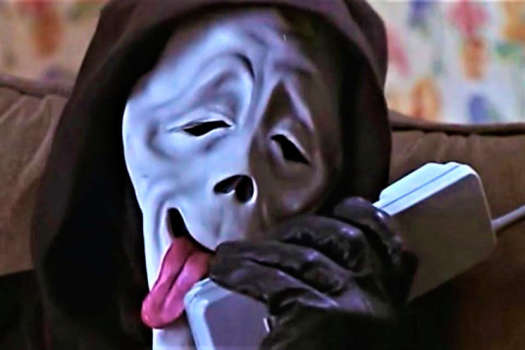The third film in Palestinian Christian director Elia Suleiman's Chronicle trilogy, following Chronicle of a Disappearance and Divine Intervention: A Chronicle of Love and Hate, returns to the topic of Palestinian oppression with a decidedly more mournful tone than his previous caustic outings. Still, he maintains his slapstick, Jacques Tati-esque style, creating a carnival-like lampooning of heavy political issues and polemics. But there's a deeply personal, almost defeatist end-of-the-road feeling that permeates this wry, absurdist comedy.
Spanning 60-plus years and divided into four sections, this pseudo-biography starts ten years before Suleiman's birth with his father, Fuad (Saleh Bakri), stirring up shit with Israeli troops during the state formation in 1948. Resultantly, Elia's childhood proves turbulent, lectured in school for repeating accusations of American Colonialism and Imperialism, eventually bearing witness to his father's arrest for arms smuggling.
A brief stint during Elia's teen years in the '80s carries the film to its final act, where Suleiman appears with his trademark silence, observing a corrupt, unflappable Palestinian society while living with his 80-year-old mother. This section contains the most memorable imagery, with the mother and son quietly watching their Filipina housekeeper do a karaoke rendition of "My Heart Will Go On" and Elia observing a tank following a man on a cellphone with its sights in a horrifying, yet cartoonish manner.
Filled almost entirely with political tragicomic juxtaposition, showing a choir of Arab students singing a pro-Israel state song, being rewarded by an administration proud of its diversity inclusion, The Time That Remains is a work of imagery and meaning more than a traditional story. Characters aren't so much developed as they are subjected to ridiculous marginalization and left to observe organized insanity. They are often dwarfed by overwhelming architecture and environments, running back and forth needlessly like directionless insects.
It's this dreamlike sensibility that carries a mostly didactic film through its heavy-handed machinations, making clever and amusing experiences that have obviously traumatized and influenced the filmmaker throughout his life. This style is what brings uniqueness and intrigue to the table, making for ostensibly compelling viewing.
(eOne)Spanning 60-plus years and divided into four sections, this pseudo-biography starts ten years before Suleiman's birth with his father, Fuad (Saleh Bakri), stirring up shit with Israeli troops during the state formation in 1948. Resultantly, Elia's childhood proves turbulent, lectured in school for repeating accusations of American Colonialism and Imperialism, eventually bearing witness to his father's arrest for arms smuggling.
A brief stint during Elia's teen years in the '80s carries the film to its final act, where Suleiman appears with his trademark silence, observing a corrupt, unflappable Palestinian society while living with his 80-year-old mother. This section contains the most memorable imagery, with the mother and son quietly watching their Filipina housekeeper do a karaoke rendition of "My Heart Will Go On" and Elia observing a tank following a man on a cellphone with its sights in a horrifying, yet cartoonish manner.
Filled almost entirely with political tragicomic juxtaposition, showing a choir of Arab students singing a pro-Israel state song, being rewarded by an administration proud of its diversity inclusion, The Time That Remains is a work of imagery and meaning more than a traditional story. Characters aren't so much developed as they are subjected to ridiculous marginalization and left to observe organized insanity. They are often dwarfed by overwhelming architecture and environments, running back and forth needlessly like directionless insects.
It's this dreamlike sensibility that carries a mostly didactic film through its heavy-handed machinations, making clever and amusing experiences that have obviously traumatized and influenced the filmmaker throughout his life. This style is what brings uniqueness and intrigue to the table, making for ostensibly compelling viewing.




